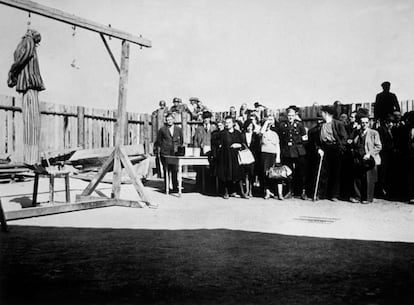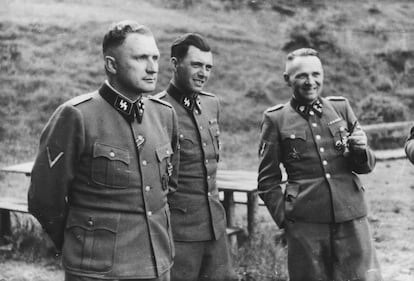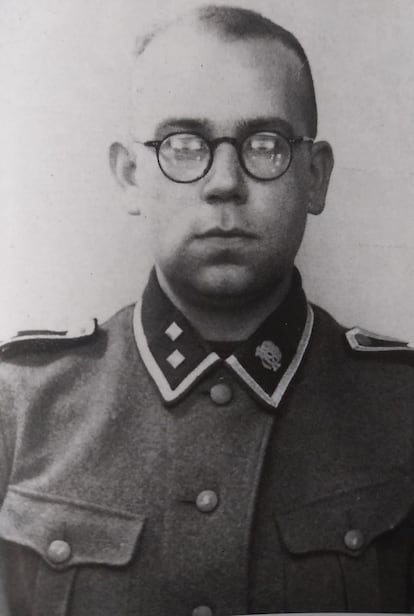Konrad Morgen, with a face of a gray office worker or offset of institute and that was not intimidating or sausage in her SS uniform, does not physically resemble the Correous and strong fiction detective Bernie Gunther, created by the pen of the long -awaited writer Philip Kerr, who also investigated crimes from within the police system of the III Reich. But that man of bottle ass and anodine bureaucrat air was someone real. A Judge and Police of the SS who lived a very dangerous life acting against his own comrades of the calendar order in the edge of the razor of the perverse Nazi judicial system and using what remained of the laws in the corrupt and amoral Hitler Universe to investigate and lead to the courts to the a whopping of 200 members of the organization.
Morgen’s list includes high positions and even concentration field commanders, the crème Of the SS, who personally arrested five, two of which were executed. He acted against such lethal characters, true brown snakes, such as Oskar Dirlewanger, leader of the most brutal and degenerate combatant brigade of the SS; Karl-Beto Koch, Buchenwald commander (also arrested his wife, the famous Ilse Koch, famous for his cruelty and lasciviousness); Colonel Hermann Fegelein, a future brother-in-law of Hitler, or Amon Göth, commander of the Kraków-Planców field, embodied by Ralph Fiennes in Schindler’s list. He even dared to put Adolf Eichmann under his magnifying glass, the final solution planner, and went to Auschwitz to investigate corruption and murders (in Auschwitz!), Facing his exasperated commander Rudolph Höss, who did not get to understand the meaning of a police investigation in the midst of the greatest crime perpetrated in the history of humanity.
Morgen (Frankfurt, 1909-1982) managed to do justice-at least a little of it-within a world in which justice did not seem possible. How he succeeded, a little in the manner of the untouchables with Capone, entering aside, is one of the most extraordinary stories of the time of Nazism and World War II.
A recent biography about Konrad Morgen, Hitler’s Crime Fighter (Biteback Publishing, 2024), of the British historian David Lee, analyzes the figure of the unusual judge and police of the SS and, without dodging the controversial aspects of his career and personality (which have predominated in other judgments about the character), he opts for a favorable verdict, considering that his role of true cushion fly of the SS, he hid an authentic indignation Moral before the Holocaust and even an attempt to, to the extent of its possibilities, put sticks on the wheels of that atrocity.
Praised scholars such as the historian Helen Fry, the book investigates Morgen’s surprising career, who miraculously survived her dangerous work and World War II, and appears to the reader to that amazing rosary of the 800 cases open by mor of the tenacity of the judge and police from within the SS against her own members. It costs to explain how within the III Reich, in an eminently criminal state, you could investigate and process (and even condemn death: Karl Koch was shot) to elements that were part of the repressive and murderous apparatus of the regime itself. But Morgen took advantage of the legal slits that were left in Hitler Germany, in which two ordinations were overlapping: the current, the usual in all civilized countries, and the Nazis laws. Morgen could not investigate and process members of the SS for the genocide they were perpetrating, but, paradoxically, for corruption or murders illegal (That is, outside the orders emanating from the dome of the Reich, especially Himmler and ultimately Hitler). It almost makes laugh (the black and sardonic laugh of a Bernie Gunther) imagine the face that was put to an SS officer that Morgen called to declare for a murder unjustified while I was working In Labor ¡in the Majdanek extermination field!, which was settled to 360,000 people, a ratio of 250 a day for four years. This stupefaction is noticeable throughout all the investigations and cases of the Judge and Police of the SS. The defendants do not give credit: then, can we kill hundreds of thousands of people in a thousand horrendous ways but not? Can we steal from Mansalva throughout Europe and strip the victims even their golden teeth, although we can’t have anything left?
In Himmler’s insane logic, Lee recalls, citing Peter Longerich, the great biographer of the Nazi leader, the SS had to act “decently”, even in the crime. And, of course, all the benefit that was extracted from the persecution and murder of the enemies of the Reich had to go, without exception, to the coffers of the state (and the box of the SS). Himmler did not want to be robbed of him, he would miss more, what villainy. To that, Morgen grabbed, who acted under the direct orders of the Reichführer to persecute members of the SS who skipped the norms and the code of honor of the organization. One of the problems Morgen had, Espina on the side of the SS, is that their accusation witnesses disappeared quickly.
Himmler forced him to stop several times, as in the case of Eichmann’s investigation for stolen diamonds: he could not be stopped when he is carrying, he was told, a secret task of the utmost importance for the Führer.

It is debatable (and some scholars have doubted their reasons) which guided Konrad Morgen in the back Poisan medical experiment with Russian prisoners of war. What is indisputable is that the neck was played facing powerful and very dangerous high positions of the organization – its main nemesis was Oswald Pohl, head of the Economic and Administrative Department of the SS – and even looking for the tickle to really diabolical characters that escaped their real punitive capacity. Several times his feet stopped – in the last instance the regime could not do without his best murderers – and on one occasion, in 1942, they even stripped him of his range and sent him to fight at the front of the east of the East Enroll as a satin soldier in a very hard combat unit of the Waffen SS with a very high number of casualties (the Granaderos Panzer regiment of the SS Germaniapart of the division Viking), A way to get rid of the angry method of metomentodo and bacon.
Surprisingly, Morgen (character who is shouting a film) returned in May 1943 first -line – Himmler requested him again for another job, investigating corruption in Buchenwald: his career reminds Bernie’s a lot to that of Bernie, Kerr’s detective – not only alive but as a soldier who fulfilled as the best and even received the badge of infantry assault.

The exciting race of Morgen in the Judicial Section of the SS, which Lee continues thoroughly, in case of case – among the most amazing, that of the doctor in Buchenwald Waldemar Hoven -, allows us to observe the unique meanders of police action and justice in the III Reich. Bernie Gunther’s royal sose, Ker’s detective whose novels David Lee declares himself a admirer and of which he emphasized that he faced similar moral challenges, even had the same bosses as this, like Arthur Nebe, who did not see any contradiction in being a detective head of the criminal police (Kripo) and commander of an extermination group, the einsatzgruppe B, with 45,000 dead behind them. After the war, Morgen, who was dismissed in 1948, continued his work in the field of justice and acted as a witness in various judgments against Nazi criminals, including those of Nurenberg. His inquiries allowed Morgen to witness the Nazi atrocities such as the Tour that organized him for the Birkenau extermination machinery or the results of the Jewish massacre in the operation festival of the harvest, Aktion Erontefest, In Lublin in 1943 while investigating Christian Wirth, head of the fields of death in Poland.
His personal life was marked by his romance with a woman, María Wachter, with whom the SS did not allow him to marry the regime, and with whom he married at the end of the contest. David Lee points out that Morgen, who described himself as Justice fanatica “fan of justice”, would not have seemed a guy as attractive as Bernie Gunther: he lacked his cynical sense of Berlin humor and his existentialism, and of his hectic sentimental life; The traditional German values and a strong sense of honor were entrenched. But both – the Royal Police and the fictitious – put their talents of wise researchers at the service of the most terrible employers who can imagine, and had the boldness and courage to skip their rules.

